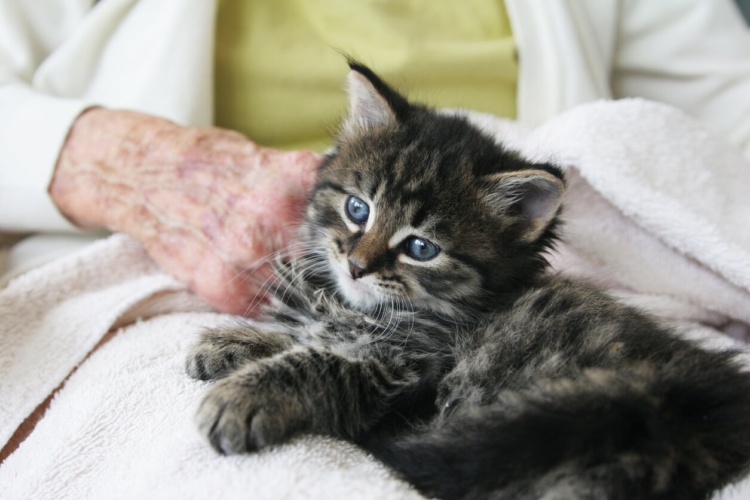Cats are the best. Not only are they adorable, fun to watch, and a delight to play with – but they’re some of the best pet therapy animals around. I mean, sure, dogs can be cute and give you kisses. Birds can talk, while fish are entertaining to watch. But cats can do ALL these things – AND PURR. Checkmate. (And, yes, meows count as talking. Come at me. …I also know that pet therapy isn’t a competition.)
Beyond making for great pet therapy animals in general, cats can be especially helpful to seniors who are suffering from Alzheimer’s or loneliness or who need a little help in improving motor skills or their blood pressure.
What Is Pet Therapy?
Pet therapy is a form of mild therapy using the interaction between a person and an (often trained) animal to help that person recover from some physical issue (heart disease high blood pressure) or a mental health issue (dementia, depression, anxiety, and more). Pet therapy can take place in a variety of settings, from nursing homes and rehabilitation centers to hospices and private homes. This type of therapy can also be provided using a variety of animals, from the usual dogs and cats to fish, birds, and even some farm animals! Cats, of course, are the coolest.
What Benefits Can Pet Therapy Have For Older Folks?
Pet therapy with cats can have positive effects on both the physical and mental health of the elderly. Now, an older person doesn’t need to be chasing a kitten or adolescent cat around, but they can interact with calm and trained felines just fine. Playing with cats with a fishing line toy can improve an elderly person’s coordination and motor skills, and interacting with the cat’s handler or other people with their own pets can improve their recall and help treat dementia – while also lessening any feelings of isolation. Petting kitties, especially while they’re purring, can contribute to bringing blood pressure down, lessen stress, and even help folks use less medication.
The emotional benefits of cats in pet therapy don’t stop at making older folks feel less lonely, either! Caring for a cat – even if only in a therapy session – can help one feel needed, and call up positive feelings such as compassion and comfort. Cuddling cats can help an anxious person feel more calm, and offer some surcease and purpose to the depressed. Engaging in the positive bond of cat ownership can also increase one’s self-esteem. (I know, I know – we’ve all had kitties give us the stink eye before! But doesn’t all that just seem to melt away when they crawl into your arms and purr themselves to sleep?)
Different Types of Pet Therapy
Pet therapy can be a broad term referring to a few different programs, but here are two of the most common:
Visitation Therapy. In this type of therapy, a trained pet therapy team (a cat and their handler) visits the elderly at an assisted living facility or senior center (for example) for positive senior-feline interaction. The elderly can play with or pet the cats, and the handler is on hand throughout.
Ownership Therapy. For this type of therapy, the senior in question may wish to adopt a cat of their own. This is best for those who are capable of managing the responsibilities of pet ownership and living independently. The cat they choose may not be trained, but should be of a moderate temperament.
Best Cats for Pet Therapy
Of course, you can’t just take any cat and have it be a pet therapy cat! Animals used for pet therapy must have some obedience training, and be well socialized and okay with meeting and interacting with new people frequently. They should also not exhibit any aggression towards other animals or people and be okay walking around on a harness and leash. Confident and serene cats tend to make the best therapy cats – which means my own Tiger Jack would be a star. (His Royal Floofiness loves to meet everyone and be petted and he’s really quite a giving orange tabby monarch.)
If you know someone who might benefit from pet therapy (with a cat!), they can reach out to their physician or senior living facilities and ask about local pet therapy organizations. And if you think you and your cat could team up to be a fantastic pet therapy team? Reach out to a group like Pet Partners.







Deborah Brannon, thank you for this post. Its very inspiring.